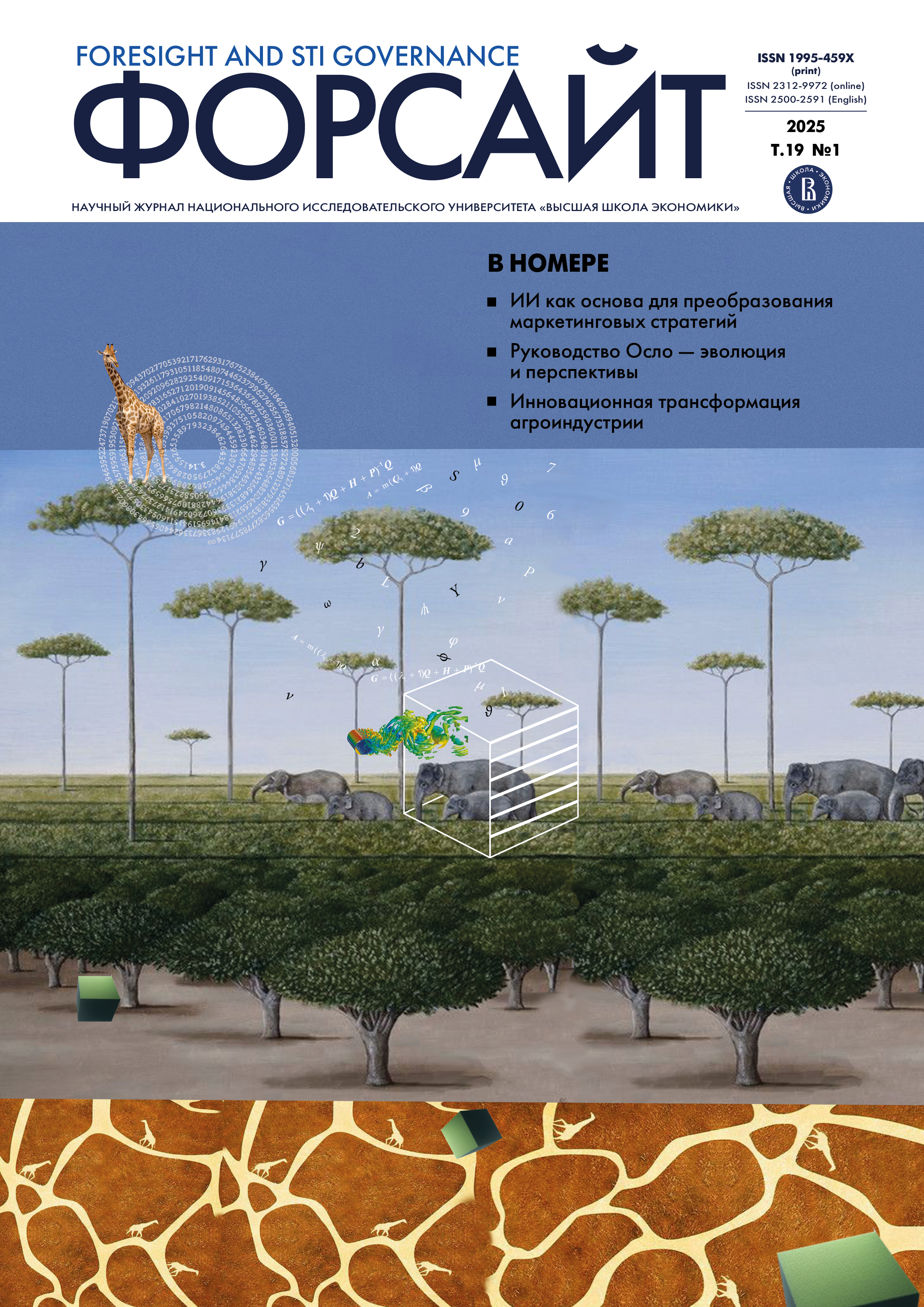Аннотация
В статье с помощью теории подрывных инноваций проанализированы возможности небольших компаний радикально трансформировать рынок маркетинговых услуг с помощью генеративного искусственного интеллекта (ИИ). В основе исследовательского подхода — комплексный обзор литературы и углубленные интервью с руководителями маркетинговых фирм с последующей обработкой данных методами естественного языка и тематического анализа. Применение генеративного ИИ в маркетинге впервые рассмотрено через призму теории подрывных инноваций, что вносит ценный вклад в формирующийся массив знаний о применении данной технологии в отрасли. Разработаны рекомендации по развитию этого направления для исследователей и специалистов-практиков.
Результаты показывают, что раннее внедрение ИИ способно обеспечить небольшим фирмам конкурентное преимущество за счет выявления недостаточно охваченных рынков и предложения инновационных, экономически эффективных услуг. Хотя маркетинговые компании находятся на разных стадиях внедрения ИИ, они рассматривают эту технологию как инструмент усиления творческого потенциала своих сотрудников. В статье выявлена потребность в развитии новых компетенций — прежде всего навыков работы с ИИ и стратегического мышления. Особо отмечена необходимость человеческого контроля над решениями, предлагаемыми ИИ.
Литература
Acemoglu D., Autor D., Hazell J., Restrepo P. (2022) Artificial Intelligence and Jobs: Evidence from Online Vacancies. Journal of Labor Economics, 40(S1), 293-340. https://doi.org/10.1086/718327.
Ameen N., Sharma G.D., Tarba S., Rao A., Chopra R. (2022) Toward advancing theory on creativity in marketing and artificial intelligence. Psychology & Marketing, 39(9), 1802-1825. https://doi.org/10.1002/MAR.21699.
Beckett D. (2021) The New Agency Model: Adapt or Die. Entrepreneur, 12.07.2021. https://www.entrepreneur.com/business-news/the-new-agency-model-adapt-or-die/376528, дата обращения 18.10.2024.
Bower J.L., Christensen C.M. (1995) Disruptive Technologies: Catching the Wave. Harvard Business Review, May 1995, 43-53.
Canavan D., Scott P.S., Mangematin V. (2013) Creative professional service firms: Aligning strategy and talent. Journal of Business Strategy, 34(3), 24-32. https://doi.org/10.1108/JBS-10-2012-0058/FULL/PDF.
Chen J., Zhu Z., Zhang Y. (2017) A study of factors influencing disruptive innovation in Chinese SMEs. Chinese SMEs, Asian Journal of Technology Innovation, 25(1), 140-157. https://doi.org/10.1080/19761597.2017.1302552.
Christensen C., Raynor M., Anthony S. (2003) Six Keys to Building New Markets by Unleashing Disruptive Innovation - HBS Working Knowledge, Cambridge, MA: Harvard Business School Press.
Christensen C.M., Raynor M., McDonald R. (2015) What is Disruptive Innovation? Harvard Business Review, 93(12), 44-53.
Davenport T., Guha A., Grewal D., Bressgott T. (2020) How artificial intelligence will change the future of marketing. Journal of the Academy of Marketing Science, 48(1), 24-42. https://doi.org/10.1007/S11747-019-00696-0/FIGURES/2.
Dilmegani C. (2023) Generative AI in Marketing: Benefits & 7 Use Cases in 2023. AIMultiple, 25.10.2023. https://research.aimultiple.com/generative-ai-in-marketing/, дата обращения 18.10.2024.
Fitzgerald M., Kruschwitz N., Bonnet D., Welch M. (2013) Embracing Digital Technology. A New Strategic Imperative. MIT Sloan Management Review, 07.10.2023. https://sloanreview.mit.edu/projects/embracing-digital-technology/, дата обращения 18.10.2024.
Gill L. (2023) Generative AI In Marketing: 5 Use Cases. Forbes, 03.04.2023. https://www.forbes.com/sites/forbescommunicationscouncil/2023/04/03/generative-ai-in-marketing-5-use-cases/?sh=3ced10c046dd, дата обращения 09.10.2024.
Graham M. (2023) Five Things Marketers Should Know About Generative AI in Advertising. Wall Street Journal, 16.03.2023. https://www.wsj.com/articles/five-things-marketers-should-know-about-generative-ai-in-advertising-5381c1d0, дата обращения 15.09.2024.
Harris Z. (2024) AI Content Creation Tools: 7 Tools to Supercharge Production. Copy.Ai, 26.06.2024. https://www.copy.ai/blog/ai-content-creation, дата обращения 08.09.2024.
Hoffman D.L., Moreau C.P., Stremersch S., Wedel M. (2022) The Rise of New Technologies in Marketing: A Framework and Outlook. Journal of Marketing, 86(1), 1-6. https://doi.org/10.1177/00222429211061636.
Kapoor N. (2017) Agency of the future: Next-generation operating models for marketing agencies, London: PWC.
Kassicieh S.K., Kirchhoff B.A., Walsh S.T., McWhorter P.J. (2002) The role of small firms in the transfer of disruptive technologies. Technovation, 22(11), 667-674. https://doi.org/10.1016/S0166-4972(01)00064-5.
Larsen B., Narayan J. (2023) Generative AI - a game-changer society needs to be ready for, Geneva: World Economic Forum.
Larson C. (2016) What Is Disruptive Innovation Theory? 4 Key Concepts. HBS Online, 15.11.2016. https://online.hbs.edu/blog/post/4-keys-to-understanding-clayton-christensens-theory-of-disruptive-innovation, 04.04.2023.
Lee P.S., Chakraborty I., Banerjee S. (2023) Artificial Intelligence Applications to Customer Feedback Research: A Review. In: Artificial Intelligence in Marketing (eds. K. Sudhir, O. Toubia), Bingley (UK): Emerald, pp. 169-190. https://doi.org/10.1108/S1548-643520230000020010.
Leeflang P.S.H., Verhoef P.C., Dahlström P., Freundt T. (2014) Challenges and solutions for marketing in a digital era. European Management Journal, 32(1), 1-12. https://doi.org/10.1016/j.emj.2013.12.001.
Montana P.J., Petit F., McKenna T.M. (2014) Marketing executive development in a changing world: The needed executive skills. Journal of Management Development, 33(1), 48-56. https://doi.org/10.1108/JMD-11-2013-0136.
Nogami V.K., Veloso A.R. (2017) Disruptive innovation in low-income contexts: Challenges and state-of-the-art national research in marketing. RAI Revista de Administração e Inovação, 14(2), 162-167. https://doi.org/10.1016/J.RAI.2017.03.005.
O’Reilly C., Binns A.J.M. (2019) The three stages of disruptive innovation: Idea generation, incubation, and scaling. California Management Review, 61(3), 49-71. https://doi.org/10.1177/0008125619841878.
Pérez-Luño A., Wiklund J., Cabrera R.V. (2011) The dual nature of innovative activity: How entrepreneurial orientation influences innovation generation and adoption. Journal of Business Venturing, 26(5), 555-571. https://doi.org/10.1016/J.JBUSVENT.2010.03.001.
Ritz W., Wolf M., Mcquitty S. (2019) Digital marketing adoption and success for small businesses: The application of the do-it-yourself and technology acceptance models. Article in Journal of Research in Interactive Marketing, 13(2), 179-203. https://doi.org/10.1108/JRIM-04-2018-0062.
Rust R.T., Smith R.H., Lilien G.L. (2019) The future of marketing. International Journal of Research in Marketing, 37(1), 15-26. https://doi.org/10.1016/j.ijresmar.2019.08.002.
Singh J., Flaherty K., Sohi R.S., Deeter-Schmelz D., Habel J., Le Meunier-Fitzhugh K., Malshe A., Mullins R., Onyemah V. (2019) Sales Profession and Professionals in the Age of Digitization and Artificial Technologies: Concepts, Priorities, and Questions. Journal of Personal Selling & Sales Management, 39(1), 2-22. https://doi.org/10.1080/08853134.2018.1557525.
Wijayati D.T., Rahman Z., Fahrullah A., Rahman M.F.W., Arifah I.D.C., Kautsar A. (2022) A study of artificial intelligence on employee performance and work engagement: The moderating role of change leadership. International Journal of Manpower, 43(2), 486-512. https://doi.org/10.1108/IJM-07-2021-0423/FULL/XML.

Это произведение доступно по лицензии Creative Commons «Attribution» («Атрибуция») 4.0 Всемирная.


